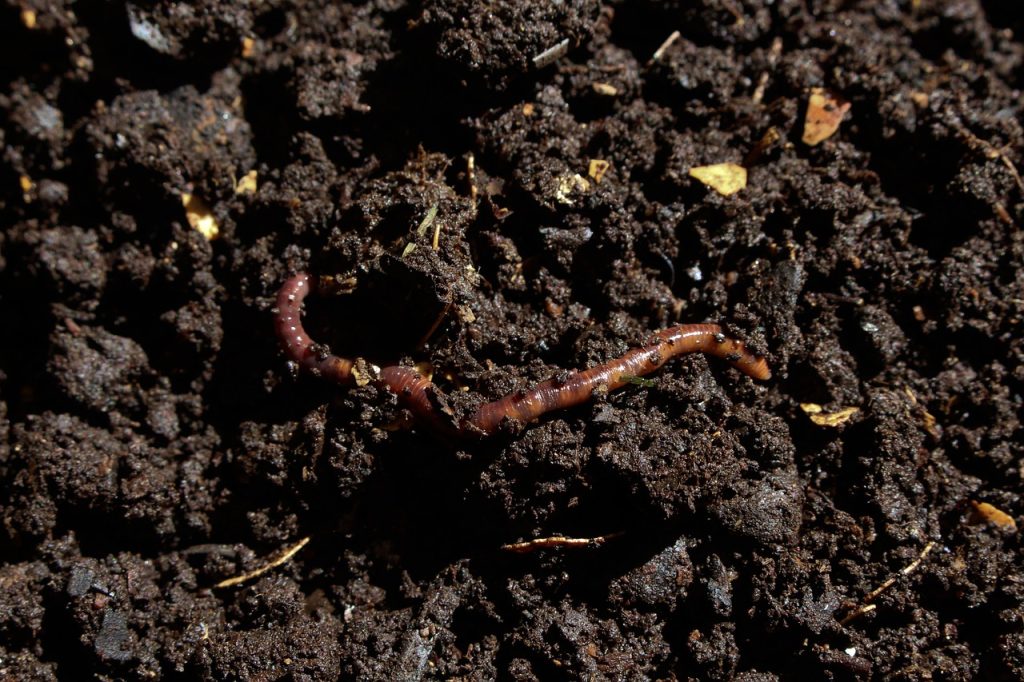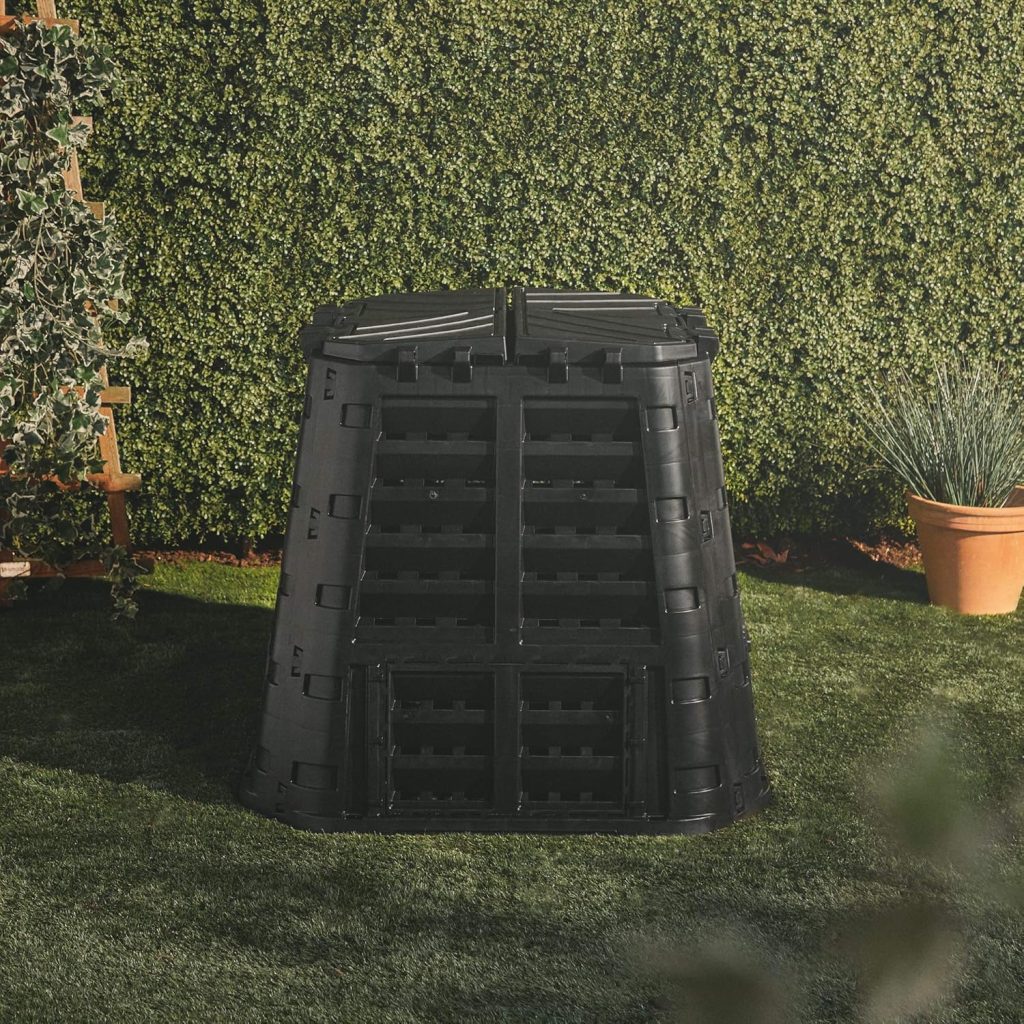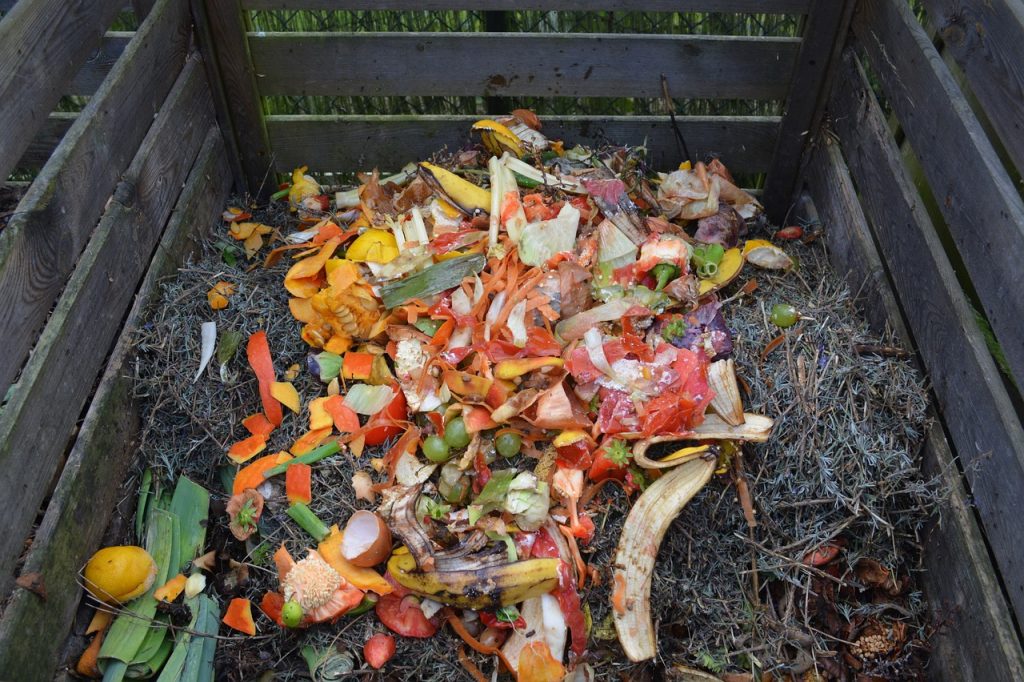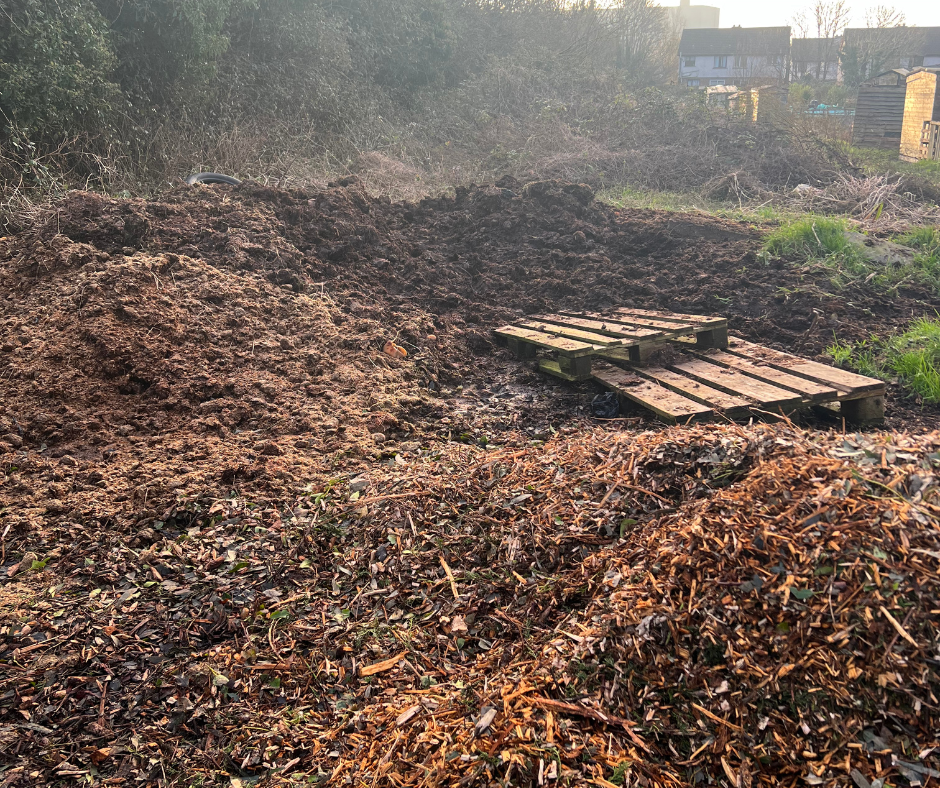If you want to make compost for your allotment garden—or even for your home garden—read on for a beginner-friendly introduction to composting, where everyday kitchen waste transforms into nutrient-rich soil. Composting is more than just an eco-friendly habit; it’s a powerful way to improve soil fertility, boost plant growth, and reduce waste.
I’ve been composting for over 10 years using every type of container imaginable, and it’s not only saved me money but also become a fun and educational activity to share with the kids. In this blog post, I’ll guide you through the basics of composting and help you build a sustainable, productive system for your own allotment.

What is Compost?
Compost is made from once-living materials that have broken down through natural decomposition. Compost is the result of a natural process where organic materials decompose into a nutrient-rich soil conditioner. By recycling kitchen scraps and garden waste, composting creates a sustainable way to enrich your soil, improve plant growth, and reduce landfill waste.
Why Do We Need Compost?
When growing your own fruits and vegetables, healthy soil is everything. Plants absorb nutrients like nitrogen, phosphorus, and potassium directly from the soil through their root systems. Over time, especially in productive food gardens, these nutrients become depleted. Compost replenishes the soil naturally, offering a slow-release source of these essential elements. It also improves soil texture, enhances moisture retention, and encourages beneficial microbial life.
When Should You Make Compost?
You can start composting at any time of the year, but spring and autumn are ideal seasons to begin. In spring, rising temperatures jump-start microbial activity, while autumn brings an abundance of fallen leaves to balance nitrogen-rich summer scraps. Composting is a continuous cycle—you can keep adding to your bin year-round as long as you maintain the right balance of materials. With a little attention and care, your compost pile will keep working through every season.
How Do You Use Compost?
Once your compost is ready—dark, crumbly, and smelling earthy—it can be used throughout your allotment or garden. Simply spread a layer over your beds as a mulch to enrich the soil, retain moisture, and suppress weeds. Compost is especially valuable for feeding hungry crops like tomatoes, squash, and brassicas, and it can be mixed into potting soil for container plants. Think of compost as a natural, slow-release fertiliser that continually feeds your plants and supports healthy growth from root to leaf.
Composting is a Natural Process
In nature, decomposition happens continuously as leaves, plants, and organic matter break down over time, enriching the soil. Composting is simply a way to accelerate this natural process by creating optimal conditions for microbes, fungi, and worms to convert waste into food for plants. By composting, we work hand in hand with nature, mimicking the cycle of decay and renewal that keeps ecosystems thriving.

This post contains affiliate links, which means Barefoot Bliss and Books make a small commission at no extra cost to you. See the full disclosure here.
A Compost Heap: A Hidden Haven for Garden Wildlife
Beyond recycling waste, a compost heap also serves as a valuable habitat for garden wildlife. It provides a warm, moist environment that attracts beneficial creatures like worms, beetles, centipedes, and woodlice—all of which help break down organic matter. You may even find frogs or hedgehogs sheltering nearby. These small animals play a vital role in the decomposition process and contribute to a thriving, balanced ecosystem in your allotment.
How Composting Works
Composting is a natural decomposition process where organic waste breaks down into a nutrient-rich soil conditioner, thanks to the activity of microorganisms, fungi, and helpful insects. The key to successful composting lies in creating the right environment for these tiny decomposers to thrive—this means keeping a good balance between greens (nitrogen-rich materials) and browns (carbon-rich materials). Greens include fruit and vegetable peels, coffee grounds, tea bags, and fresh grass clippings, while browns consist of dry leaves, straw, cardboard, shredded newspaper, and wood chips.
Nitrogen fuels microbial growth, while carbon provides the energy microbes need to do their work. When these elements are in the right proportion—typically a 2:1 ratio of browns to greens—your compost heap will heat up and break down efficiently. Moisture and oxygen are also vital: a compost pile should feel like a wrung-out sponge and be turned regularly to introduce fresh air. As the materials decompose, they transform into a dark, crumbly, earthy-smelling compost that’s packed with nutrients—perfect for feeding your garden.
Setting Up Your Compost Bin
Choosing the right composting system is crucial for efficiency and convenience. Options include:
- Traditional compost bins – Ideal for larger allotments, these enclosed bins help retain heat and moisture. Try a sturdy model like the Green Johanna Food Waste Composter for quicker results, or a 480L VonHaus Compost Bin for a classic budget-friendly option.
- Compost piles – A no-cost solution that allows for easy turning and aeration if you have the space.
- Worm composting (vermicomposting) – Perfect for those looking to speed up the process and produce high-quality compost. A great choice is the Wiggly Wigglers Compact Worm Farm which is compact and child-friendly.
To maintain efficiency, consider adding a compost aerator tool to help mix your pile without too much effort.

Ensure your composting area has good drainage and aeration to support decomposition. Place the bin in a shaded yet accessible spot to maintain the right moisture levels and make it easy to add kitchen scraps regularly.
What to Compost (and What to Avoid!)
A well-balanced compost pile includes:
✅ Greens (Nitrogen-rich): Fruit and vegetable scraps, coffee grounds, eggshells, grass clippings.
✅ Browns (Carbon-rich): Dry leaves, straw, shredded cardboard, newspaper.
🚫 Avoid: Meat, dairy, oily foods, pet waste, and anything treated with chemicals, as these can attract pests or slow down decomposition.

Maintaining the Perfect Balance
A healthy compost pile should have roughly a 2:1 ratio of browns to greens. Too many greens create a smelly, slimy compost, while too many browns slow down the breakdown process. Turn your compost regularly to aerate it and speed up decomposition.
Troubleshooting Common Composting Issues
- Bad Odours? Add more browns and turn the compost to improve airflow.
- Pests? Bury food scraps under a layer of dry materials and avoid adding unsuitable waste.
- Slow Decomposition? Chop materials into smaller pieces and check for the right moisture balance.
When is the Compost Ready?
Depending on your composting method, finished compost—also known as black gold—can take a few weeks to several months to develop. You’ll know it’s ready when it’s dark, crumbly, and has an earthy smell. Once matured, use your compost to enrich soil, improve water retention, and boost plant health in your allotment.

Why Composting is a Game-Changer for Your Allotment
- Improves soil structure
- Enhances moisture retention
- Boosts beneficial microbial activity
- Reduces reliance on chemical fertilisers
- Cuts down on household waste
OTHER POSTS YOU MAY ENJOY
Composting isn’t just for adults—it’s a fantastic hands-on learning experience for kids! Encouraging children to help with composting teaches them about nature, sustainability, and the importance of reducing waste. There are lots of fun composting activities for children from compost bingo to creating a worm farm.
Here are some more posts packed with engaging, family-friendly activities to help you make the most of your gardening space.
5 Fun and Easy Allotment Gardening Activities for Kids
Want to get your kids involved at the allotment or in the garden? This post shares simple, engaging gardening activities perfect for little green thumbs—no experience needed! From planting some wild flowers with seed bombs to building a DIY bug hotel, these activities make allotment gardening fun and educational.
5 More Fun and Easy Activities at the Allotment
Looking for more ways to keep your children entertained while spending time at the allotment? This post includes creating your own strawberry patch and having a herbal tea party along with 3 other ideas for fun and easy activities at the allotment.
Let’s Grow Together
I’d love to hear how your composting journey goes! Share your progress, tips, or questions in the comments below—or tag me on social media with photos of your compost setup. And don’t forget to subscribe to the blog for more practical allotment tips, gardening how-tos, and family-friendly sustainability projects.

[…] In my next posts I will discuss the no-dig approach to gardening and how to make your own compost. […]